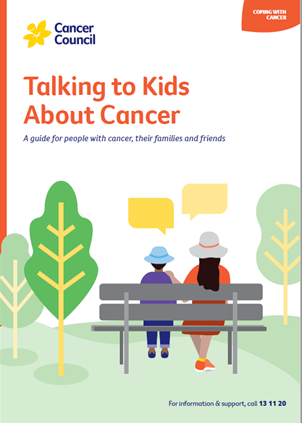- Home
- About Cancer
- Family and friends
- Talking to kids about cancer
- Talking about the diagnosis
- When another child has cancer
When another child has cancer
In most cases, children will first learn about cancer when an adult in their life has been affected (e.g. a grandparent, aunt or teacher). So it can be confusing and frightening for children if a young friend or cousin is diagnosed with cancer.
Causes of cancer
Let your child know that childhood cancers are not lifestyle-related (e.g. caused by sun exposure or smoking), nor does a child get cancer because of naughty behaviour or a minor accident like a bump on the head. There’s nothing anyone did to cause the cancer.
It’s not contagious
Children need to feel safe around the child with cancer. Tell them that cancer can’t be passed on to other people. If the sick child is in isolation, this is to protect the child from infection, not to protect everyone else from the cancer.
Most children get better
Like adults, children may worry that cancer means their friend will die. Reassure children that although cancer is a serious, life-threatening disease, the overall survival rate for children is now almost 85%. This can vary depending on the diagnosis, but most children will survive cancer.
Expect change
Explain that things will change for the friend. They may feel too tired to play or may be away from school a lot. They may have physical changes (e.g. have hair loss or need to use a wheelchair). Encourage your child to focus on what hasn’t changed – their friend’s personality and their friendship.
Visit the hospital if possible
It can be confusing for your child if the person with cancer disappears from their life after diagnosis. They may imagine the worst. It may be helpful to take your child to visit their friend in hospital, but first check with the friend’s parents and with the hospital to be sure visitors are allowed. Before the visit, let your child know that it’s natural to wonder how to act and what to say. The more time they spend with their friend, the more they’ll relax.
Keep in touch
If a hospital visit is not possible, there are other ways for your child to maintain the relationship with their friend. Younger children might like to make a card or a decoration for the hospital room, or you could organise time for a video call. Older children may prefer to communicate by phone or social media.
Encourage expression of feelings
Let your child know that it’s okay to have lots of different emotions and that you have them too.
→ READ MORE: Answering key questions about diagnosis
Podcast: Explaining Cancer to Kids
Listen to more episodes from our podcast for people affected by cancer
More resources
Prof Jane Turner AM, International Psycho-Oncology Society President Emeritus, The University of Queensland, QLD; Taylor Baker, Consumer; Dr Ben Britton, Principal Clinical and Health Psychologist, Head of Psychology, Hunter New England Mental Health, NSW; Camp Quality; Dr Lisa Cuddeford, Head of Department, WA Paediatric Palliative Care Service, Perth Children’s Hospital, WA; A/Prof Peter Downie, Head, Paediatric Haematology–Oncology and Director, Children’s Cancer Centre, Monash Children’s Hospital, VIC; Dr Sarah Ellis, Clinical Psychologist, Kids Cancer Centre, Sydney Children’s Hospital, NSW; Malia Emberson-Lafoa’i, Consumer; Kate Fernandez, 13 11 20 Consultant, Cancer Council SA; Jane Gillard, Consumer; Mary McGowan OAM, International Childhood Cancer Advocate, VIC; Annette Polizois, Senior Social Worker, Women, Family and Emergency Care Team, Royal North Shore Hospital, NSW; Rhondda Rytmeister, Clinical Psychologist, HeadWayHealth (formerly Snr Clinical Psychologist, The Cancer Centre for Children, Westmead, NSW); Nadine Street, Head of Social Work and Social Welfare, HNE Mental Health Service, NSW; Warren Summers, Online Counsellor, Canteen, NSW.
We would also like to thank the health professionals, consumers, organisations and editorial teams who have worked on previous editions of this title, and we are grateful to the parents and young people whose real-life stories have added to the richness and relevance of this book.
We thank and acknowledge Dr Paula K. Rauch, MD, Founder and Director, Marjorie E. Korff PACT (Parenting At a Challenging Time) Program and Associate Professor of Psychiatry, Harvard Medical School, whose research and writing on helping parents talk to their children about cancer was used as source material for this book and has been adapted in several sections: pages 8–11, How children understand cancer; page 22, Answering key questions: Are you going to die?; page 26, Involving the school or preschool; pages 30–31, Hospital visits; and pages 36–37, Encouraging family time. We also thank the American Cancer Society for permission to use and adapt material on pages 8-11 from its book Cancer in Our Family: Helping children cope with a parent’s illness (2013); Macmillan Cancer Support for permission to use its book Talking to Children and Teenagers When an Adult Has Cancer (2013) as a source of information; Jessica Watt, Oncology Social Worker, The Children’s Hospital at Westmead, for her contribution on page 20, When another child has cancer; and Diane McGeachy, Hobart Counselling Centre, for contributing material for page 37, Spending one-on-one time.
View the Cancer Council NSW editorial policy.
View all publications or call 13 11 20 for free printed copies.

